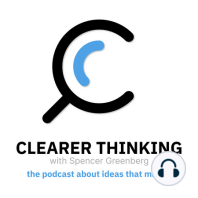58 min listen

Self-Improvement and Research Ethics with Rob Wiblin
Self-Improvement and Research Ethics with Rob Wiblin
ratings:
Length:
153 minutes
Released:
Jan 7, 2021
Format:
Podcast episode
Description
What are the best strategies for improving ourselves? How are line managers useful? Why does Rob prefer long-form content for the 80,000 Hours podcast? What are the sorts of things humans value and why? In what ways do research ethics considerations fail to achieve their stated objectives? Why are prediction markets useful?Rob Wiblin is the Head of Research at 80,000 Hours where he investigates how people can do more good in the course of their career and produces a long-form interview show called the 80,000 Hours Podcast. He studied genetics and economics in Australia before moving to the UK to help develop the emerging field of effective altruism. You can learn more about Rob at robwiblin.com, learn more about his research work at 80000hours.org, and follow him on social media at @robertwiblin.
Released:
Jan 7, 2021
Format:
Podcast episode
Titles in the series (100)
Spencer Greenberg @ THINKERS Workshop by Clearer Thinking with Spencer Greenberg